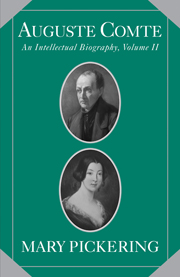Book contents
- Frontmatter
- Contents
- Acknowledgments
- Abbreviations and Notes
- Introduction
- 1 1843–1844: The Battle against the Pedantocracy
- 2 Tensions in Comte's Relationships, 1842–1846
- 3 Clotilde de Vaux and the Initial Encounter with Comte
- 4 The Muse's Tragic End
- 5 Pain and Recognition
- 6 The Revolution of 1848
- 7 Discours sur l'ensemble du positivisme
- 8 Personal and Professional Disappointments
- 9 The Early Development of the Religion of Humanity
- 10 The Development of the Positivist Movement
- Conclusion
- Bibliography
- Index
- References
Introduction
Published online by Cambridge University Press: 06 January 2010
- Frontmatter
- Contents
- Acknowledgments
- Abbreviations and Notes
- Introduction
- 1 1843–1844: The Battle against the Pedantocracy
- 2 Tensions in Comte's Relationships, 1842–1846
- 3 Clotilde de Vaux and the Initial Encounter with Comte
- 4 The Muse's Tragic End
- 5 Pain and Recognition
- 6 The Revolution of 1848
- 7 Discours sur l'ensemble du positivisme
- 8 Personal and Professional Disappointments
- 9 The Early Development of the Religion of Humanity
- 10 The Development of the Positivist Movement
- Conclusion
- Bibliography
- Index
- References
Summary
The task of the modern era was the realization and humanization of God – the transformation and dissolution of theology into anthropology.
Ludwig FeuerbachIn 2005, an American conservative weekly, Human Events, published a list of the “ten most harmful books of the 19th and 20th centuries.” Not surprisingly, Karl Marx's Communist Manifesto, Adolf Hitler's Mein Kampf, and Mao Zedong's Quotations (Little Red Book) earned the first, second, and third spots, respectively. What was remarkable was that the eighth most dangerous book was the Cours de philosophie positive (1830–42), Auguste Comte's first masterpiece. This book introduced Comte's philosophy of positivism, which Human Events considered a threat to society because it denied the existence of God, asserting that “man alone, through scientific observation, could determine the way things ought to be.” Curiously, in 2003, the well-known French author and critic of liberalism Michel Houellebecq commended Comte: “Of all the structures produced by a society which do their part in establishing it, religion appears to him to be the most important, the most characteristic and the most threatened: man according to Comte can be defined approximately as a social animal of a religious type.” Comte was “one of the first to realize that the foundations of the social world were going to disappear” and that “religion as a system of explanations of the world” was obsolete.
- Type
- Chapter
- Information
- Auguste ComteAn Intellectual Biography, pp. 1 - 14Publisher: Cambridge University PressPrint publication year: 2009



